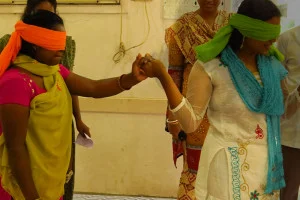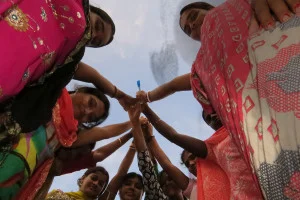Learning from Leaders
What is youth leadership to you?
The answer to this question will yield a wide variety of different responses. We asked this question to survivors of human trafficking- who are now organized into survivor collectives fighting against human trafficking and are leaders in their communities in their own right.25 leaders from two survivor collectives- Utthan and SAANS participated in a study and responded to a set of questions on youth leadership and the role of mentoring organizations and here is what I, as the Youth Leadership Coordinator, learnt from them:
Some context:
The survivor collectives are based in two separate geographical locations. Utthan operates in the districts of North 24 Parganas and South 24 Parganas, West Bengal. Sramik Andolan Aur Nyay Sangathan (SAANS) operates in the Balodabazar, Mahasamud and Bilaspur in Chhattisgarh.
Utthan is a collective of female bodied individuals who are survivors of sex trafficking. SAANS is predominantly comprised of survivors of labour trafficking. Utthan members live and work in a predominantly agrarian society. SAANS operates in villages that are migrant labourer settlements.
My attempt in this article is to reflect on leadership themes that were common to both the groups despite their differences.
There is strength in numbers
Youth leadership is collective action. In their answers, I have observed them using I and us (members of Utthan and SAANS) interchangeably. They have spoken about being able to challenge injustice as a group and they have repeatedly stressed the strength in numbers. This idea of leadership as a collective action is often missing in urban middle-class points of view regarding leadership. Leadership often means to become the commander of the many. To rise up the ranks and wield power and influence, to be able to mobilize large numbers single-handedly. With leadership also comes fame and recognition. Photos of leaders in action and their opinions are covered by the press and this also becomes a reason for many to desire leadership positions. Most importantly, leadership increases social capital- people are there at the beck and call, some subordinates can be commanded to carry out tasks too insignificant for the leaders while simultaneously increasing their network. All of these tendencies reflect the perception of a leader as an individual. This perception is prevalent in India in its political circles: the leader as a saviour who is going to save the masses from poverty, destruction and doom. But survivor leaders, owing to their apathy towards saviour centric perceptions of social work, align towards a collective, community-based understanding of leadership.
Importance of financial aid/ stipend-
One survivor leader asked me this question, “If we spend all our time earning our livelihood, how will we engage in social work?”
It often becomes difficult for people to engage in voluntary work because they have to spend their time earning a living. Mentoring organizations supporting survivor leaders with stipends has improved their financial condition and also allows them to spend sufficient time in engaging in social work. For a leader to continue spending their time trying to change the system, they need to be able to able to afford food, shelter, clothing, medical expenses and other necessities as such. Without these, survivor leaders will have to struggle to meet these expenses and hence will be unable to carry out the actions required of a leader.
Political participation and leadership in India have been since the very beginning monopolized by the affluent classes. Resources required by leaders to campaign, tour and fund candidatures are hefty. Political parties that have been in place since before independence have been characterised by their allegiance to feudal landlord classes and the circulation between people with political power and people with capital have taken place seamlessly. During mass campaigns and days and months of travelling, their housework was being done by servants and food was being prepared by cooks. They have been able to do all of this standing on one basic reality- inheritance.
Our survivor leaders do not have that inheritance, neither the social or political capital. This is a novel phenomenon in the country that people facing multiple marginalities are emerging as leaders not singularly but as a group.
For this to be translated to reality, financial assistance in the form of stipends is essential to continue their engagement in social work.
Desire for positive change comes from experiences
During an interview, a survivor leader asked me, “Why will those who have not faced these things try to change them?”
This opened my eyes and I realised what she was saying. As feminist activists, we have said this over and over again. Why will those who don’t face the wrath of patriarchy try to change it? This survivor leader pointed out just the same. Leaders of Utthan along with anti-trafficking activism are also opposed to domestic violence and child marriage and other forms of violence against women and do not hesitate to intervene on a community level to stop these. Often a time, their involvement in social work becomes a cause of discontent within their families and they become the ones facing violence at home.
Despite these conditions, the leaders say that they will not give up, no matter what happens. This leads me to think of those instances when young students drop out of activism because their families don’t approve of it. The point that arises in the two examples is that of necessity. The lived experiences of the survivors have made them realise that the world is not a fine place and something needs to be done to change it. So, they make sure that child marriage does not happen in their village, even if that puts them at risk of violence. They do not have the privilege to turn a blind eye to exploitation violence and abuse as they are fighting against these on a daily basis.
Social identities are key to recognizing why these youth leaders need to be supported
Caste is neglected while addressing trafficking in India. Who are these people who were trafficked? Most belong to religious and social minorities- Muslims and Dalits living in suburban settings and/or belonging to financially unstable situations. If women from these social locations go missing, there won’t be political campaigns or police force mobilizations. They are the disposables of society- those who don’t deserve a blink of an eye if they are trafficked or go missing. Sadly, these communities can exert so little pressure on the systems of administration; it becomes easy for the polity to completely forget about trafficked persons or the phenomenon of trafficking.
If this is not agreeable to you, ask yourself, have you ever heard of a child of a celebrity or politician being trafficked?
Trafficking is a system that operates on social realities and thus finds out the easiest targets—they are definitely not the children of celebrities or politicians but perhaps a daughter of a man who has no work or money and is willing to send off his daughter to be able to afford food.
They are fighting stigma to become leaders in their communities
Survivors returning to their families and villages face abuse and stigma.
Even more so for women as it becomes common knowledge that these women have engaged in sex work and so their communities shun them. Young girls who have returned to school have found themselves friendless and alone as classmates have been warned by their families to not associate with them. In many cases, their own families refuse to accept them. Many have been harassed and humiliated by community members. Many survivors in their interviews have spoken about not leaving their homes for extended periods after being rescued.
But they have also spoken about how at this point in their lives, after becoming leaders, they are being able to fight this stigma and gain their position as respectable members of their community. Some have spoken about being able to influence decisions in Gram Sabha meetings, they have been able to help community members with various government schemes, and they have even supported families of migrant labourers with financial aid during the lockdown. This journey from the confines of their homes to public settings as community leaders, influencers and change-makers is rocky, to say the least. They often still face stigma but their will to fight back has resulted in them being consulted and heard on a community level.
Interactions with duty bearers have often been the cause of fear- Experiences have changed after becoming leaders
“I used to feel afraid to talk to the police. I used to feel afraid to go to the police station.”
I heard this almost in every interview. The criminal justice system in India with deep disregard for the poor, always eyeing the deprived with suspicion, always ready to accuse or dismiss concerns of those with lower social standing often inspires feelings of fear from the latter. These leaders too, owing to their social positions used to feel intimidated by the police, Block development officers and their offices, lawyers etc. It would also be easy for these duty bearers to provide misinformation to the survivors since the survivors would not have enough resources to know about police, legal and governmental procedures.
With the improvement of communication skills and building of knowledge, survivors feel capable of handling visits to BDO’s office, police station or any duty bearer. Some leaders have said that they are even welcomed into these places.
In a system where information is power, keeping masses uneducated and uninformed serves only to maintain a system of inaccessibility and inequalities—survivor leaders are in the forefront of this battle to claim a system that was never theirs and to make it better for the future.
“I am one. There are so many like me. Anyone can be a leader. I am trying to ensure that there are more like me.”
Role of NGOs is helping them exercise their agency while supporting them with things they still need help with
The role of NGOs as mentoring organizations is a new one. Previously, in the anti-trafficking movement, NGOs had a more rescue centric understanding of anti-trafficking efforts. Another extremely important development for the emergence of leaders from the anti-trafficking movement is the creation of Indian Leadership Forum against Trafficking (ILFAT). This is the first survivor’s leaders collective with more than 2500 survivors of trafficking. This essentially means the destabilization of the position of NGOs as the saviours to a supporting role of a facilitator. The power to wield the narrative has shifted from the NGOs to the survivors themselves.
Survivor leaders have welcomed this supportive role of NGOs. It gives them the space to exercise their agency and still ask for help with issues they are not equipped to deal with. NGOs are facilitating youth leadership through skill-building, knowledge building, mentoring communication skills, and providing them with necessary resources.
This concept of passing the mic that is integral to recognizing and supporting marginalized identities, is already in place within the anti-trafficking ecosystem. This demarcation between those who are supported and those who are supporting is necessary to map out privilege and marginality and to understand the nuances of mentoring a leader and becoming a leader.
Leaders are not born
Gone are the days of the theory of Great Men- men who were just born as leaders. Those great men were great leaders because of their social realities. To build a sustained movement towards social justice, it is imperative to prepare and train. It is important to build networks, it is important to discuss and deliberate but it is important to train and capacitate the foot soldiers of change. Leaders are not born, they are made—they make themselves.
My understanding of leadership has changed since I interacted with survivors leaders. My idea of leadership was moving towards a horizontal conceptualization where I did not feel the need to have leaders in movements at all. But I realized I was wrong because, in my head, I could only see feudal, brahminical personification of leaders. But the leaders of SAANS and Utthan proved me wrong. They reaffirmed my faith in leadership as a collective action, the importance of preparation and training in building leadership and the fact that marginalized people must occupy positions of leadership to bring any kind of structural changes.
Somashree Choudhury
|
Monday
,
February 15, 2021


